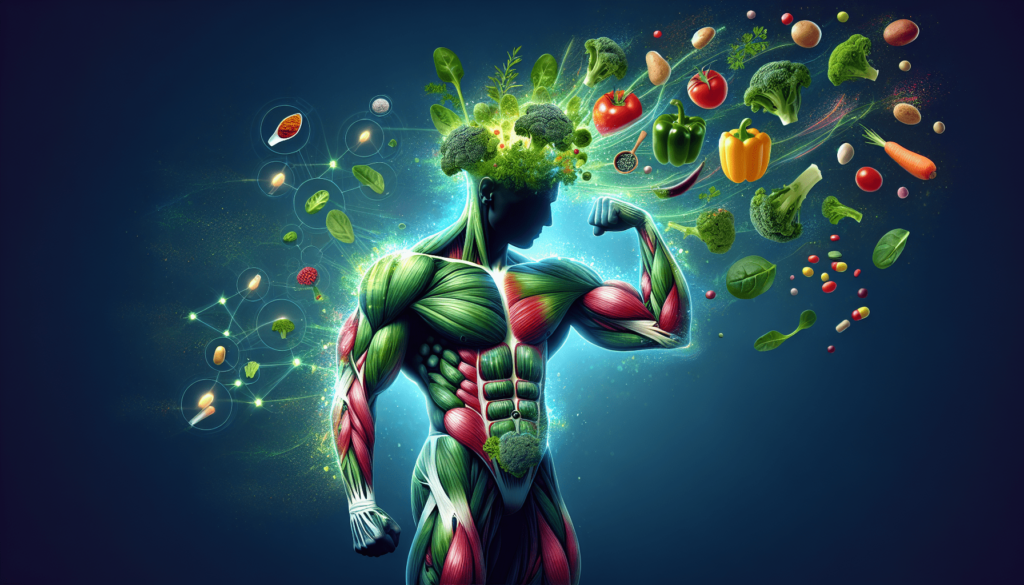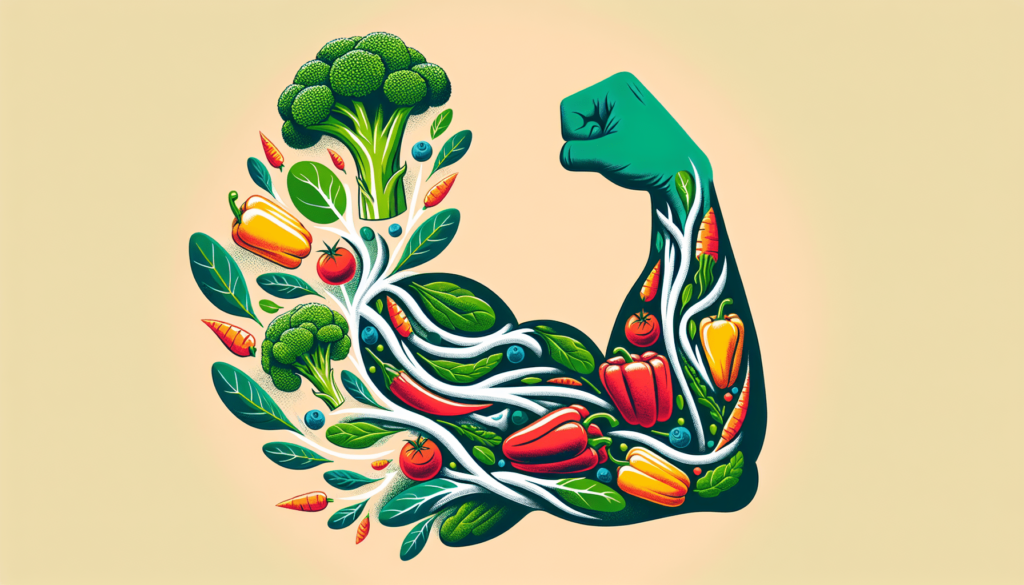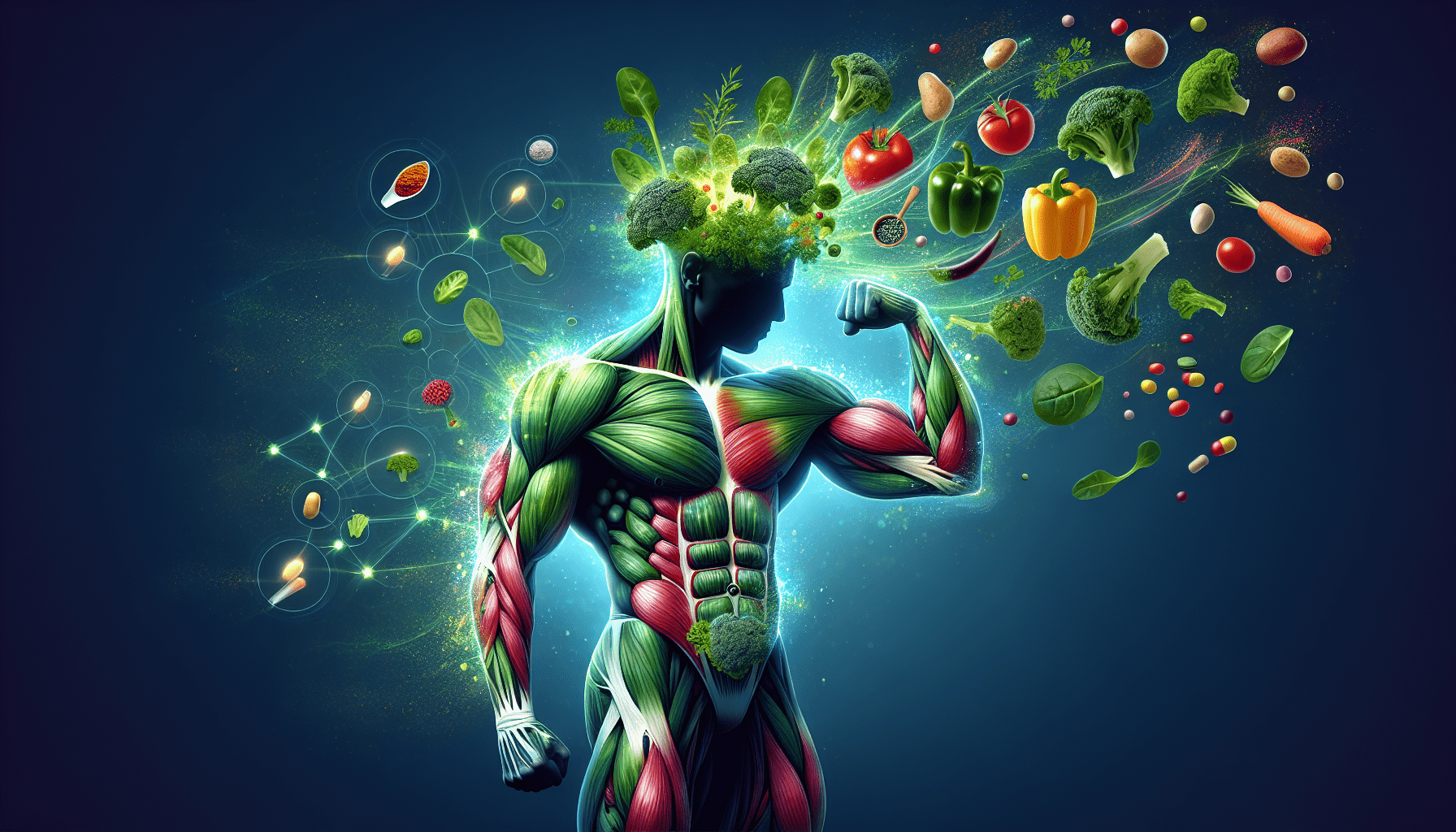Today, I’m going to show you the 20 best foods you can eat that will promote muscle growth and give you strength to keep going. If your goal is to pack on muscles, foods like chicken, eggs, and protein shakes are typically what come into your mind first. But did you know vegetables can provide massive benefits to muscle growth?
The great thing about veggies is that they contain valuable nutrients such as complex carbs, fiber, minerals, and phytonutrients, which are all essential to an effective muscle-building nutrition program. So, non-vegetable lovers, pack it up, because vegetables will always have value whatever your fitness goals are. From broccoli, which is packed with fiber and protein, to sweet potatoes, high in fiber and vitamin A, to bell peppers, with their high vitamin C content, these veggies provide a wide range of nutrients that can support muscle growth and repair. Plus, with options like kale, carrots, spinach, and more, you have plenty of choices to add variety to your diet. So, let’s dive in and explore the power of vegetables in promoting muscle growth and providing valuable nutrients.
Vegetables: Promoting Muscle Growth and Providing Valuable Nutrients
When it comes to building muscle and maintaining a healthy body, nutrition plays a crucial role. While protein-rich foods like chicken, eggs, and protein shakes may be the first things that come to mind, it’s important not to overlook the benefits that vegetables can provide. Vegetables are not just for weight loss; they contain valuable nutrients such as complex carbs, fiber, minerals, and phytonutrients that are essential for effective muscle-building nutrition. In this article, we will explore 20 vegetables that can promote muscle growth and provide valuable nutrients.
Broccoli: A Superfood for Muscle Growth
Broccoli has long been regarded as a superfood due to its numerous health benefits. For bodybuilders, broccoli is a favorite due to its high fiber and protein content. One cup of broccoli contains 1.8 grams of fiber and 3 grams of protein, making it an excellent choice for reducing hunger and supporting muscle growth. Broccoli also contains essential nutrients such as vitamin B complex, which aids muscles in efficiently using carbs and proteins to grow. Additionally, broccoli contains active ingredients like sulforaphane, quercetin, keratinoids, and camphoral, all of which contribute to building muscle.
Kale: A Nutrient-Dense Vegetable for Muscle Development
Kale is another powerhouse vegetable that offers numerous benefits for muscle development. Not only does kale provide more protein per calorie than fatty cuts of beef, but it is also rich in vitamin C, a powerful antioxidant that aids in post-workout muscle repair. Incorporating kale into your diet by adding it to green stir-fries or salads can help you build and repair muscles without the risk of gaining excess fat.
Carrots: Promoting Muscle Recovery with Antioxidants and Potassium
Carrots are not only delicious but also highly beneficial for muscle recovery. Like kale, carrots are high in antioxidants, which help decrease inflammation in the body and aid in muscle recovery. Additionally, carrots are loaded with potassium, a mineral that helps prevent muscle cramps and supports muscle growth. The beta-carotene and fiber found in carrots also provide your body with energy and support muscle growth and repair.
Spinach: Enhancing Muscle Function and Reducing Stress
Spinach is an excellent vegetable for enhancing muscle function and reducing stress on your muscles. This nitrate-rich vegetable has been shown to significantly improve muscle strength, especially in the lower limbs. The nutrients found in spinach help alleviate stress on muscles, allowing them to become stronger. By incorporating spinach into your diet, you can promote muscle growth and improve overall muscle function.

Cauliflower: Muscle Building and Testosterone Boosting
Despite its lackluster appearance, cauliflower is a vegetable that shouldn’t be underestimated when it comes to muscle building. Cauliflower contains a decent nutritional profile, and for bodybuilders, it is particularly beneficial due to its rich boron content. Boron is a mineral that aids in building muscle and boosting testosterone levels, making cauliflower an excellent addition to a muscle-building diet. Consider trying smashed cauliflower as a healthier alternative to mashed potatoes.
Cabbage: High in Vitamins and Antioxidants for Muscle Health
Cabbage is a versatile vegetable that offers numerous health benefits, including promoting muscle health. Cabbage is high in vitamins A and C, which are essential for the proper functioning of muscles, bones, and blood vessels. This vegetable also contains antioxidants and anti-inflammatory properties that improve muscle recovery. If you’re not a fan of cabbage, you can also try Brussels sprouts, which are little cabbages that offer similar benefits.
Asparagus: Protein Source with Anti-Inflammatory Properties
Asparagus is a vegetable that not only provides a good source of protein but also contains anti-inflammatory properties. This nutrient-packed vegetable is rich in vitamin K, vitamin A, and folate, making it one of the best plant-based sources of protein. Folate helps improve blood flow to working muscles, making asparagus an ideal choice for your diet plan. Additionally, asparagus contains glutathione, which may help reduce inflammation. Grilled asparagus with salt and pepper is a delicious way to enjoy this muscle-supporting vegetable.
Sweet Potatoes: Promoting Protein Synthesis with Fiber and Vitamin A
If you’re looking to satisfy your sweet tooth while promoting muscle growth, sweet potatoes are an excellent choice. Sweet potatoes are high in fiber and carbs, which provide a long-term source of energy for your muscles. They also contain a significant amount of vitamin A, which is important for protein synthesis. Consuming sweet potatoes after a workout can help replenish your muscle glycogen stores and support muscle growth.

Bell Peppers: Burning Fat and Supporting Muscle Growth with Vitamin C
Whether you choose red, yellow, or green, bell peppers are a fantastic vegetable for burning fat and supporting muscle growth. Bell peppers have the highest amount of vitamin C compared to other vegetables, and this vitamin is essential for burning fat and converting carbs into fuel. Researchers have also found that vitamin C helps the muscle tissues process carnitine, a fatty acid that promotes muscle growth and recovery.
Green Peas: Nutritious Plant-Based Protein with Antioxidants
Green peas may be an underrated vegetable, but they are highly nutritious and offer plant-based protein. With 8 grams of protein per cup, green peas are a fantastic source of protein for muscle synthesis. They also contain vitamins A and C, iron, fiber, and phosphorus, making them a well-rounded vegetable for muscle growth. Some studies have even found that consuming pea protein in conjunction with resistance training can lead to greater muscle thickness over time.
Brussels Sprouts: Protein-Rich Muscle-Building Vegetable
Brussels sprouts may not be the most appealing vegetable due to their bitter taste, but they are protein-rich and contain essential nutrients for building lean muscle. These little cabbages are packed with protein and other nutrients that your body needs for muscle growth. While the taste of Brussels sprouts may not suit everyone, their high fiber content and muscle-building properties make them a valuable addition to a muscle-building diet.
Beetroot: Muscle Recovery and Antioxidant Benefits
Beetroot has gained popularity among athletes and fitness enthusiasts due to its muscle recovery benefits. The nitrates and antioxidants present in beetroot juice have been shown to aid in exercise recovery by reducing muscle fatigue and preserving muscle function. Consuming beetroot juice before or after an intense workout can help speed up the recovery of muscle power. Incorporating beetroot into your diet can provide numerous antioxidant benefits and support overall muscle health.

Swiss Chard: Promoting Muscle Growth with Essential Nutrients
Swiss chard is a leafy green vegetable that offers essential nutrients for muscle growth. This vegetable is high in potassium, calcium, magnesium, and vitamins C and E. These nutrients are crucial for promoting muscle growth and supporting the overall function of muscles and the nervous system. While Swiss chard has a low caloric density, it can be paired with other carbohydrate-rich foods, as well as protein and healthy fats, to ensure you’re getting enough calories for muscle growth.
Tomato Juice: Exercise Recovery and Muscle Growth Support
Tomato juice has been found to be an excellent aid in exercise recovery and muscle growth. The vital chemicals found in tomatoes help muscles recover and stabilize blood levels after being stretched and strained during workouts. Green tomatoes, in particular, are rich in a compound called tomatidine, which stimulates growth in human muscle cells. Tomatoes are not only nutritious but also highly versatile in cooking, making them an easy addition to your muscle-building diet.
Onions: Aiding Testosterone Production for Muscle Mass
Onions may not be a vegetable that immediately comes to mind when thinking about muscle growth, but they can have surprising benefits. In ancient Athens, Greek athletes used onions to boost their muscle tone, and recent research has shown that there may be some truth to this. Onions have been found to improve testosterone production in men, which is crucial for muscle mass and strength. So, next time you’re cooking, don’t forget to add some onions to your meal.
Zucchini: Promoting Digestion and Muscle Health
Zucchini is a vegetable that may be composed mostly of water, but it offers several nutrients that promote digestion and muscle health. Zucchini is rich in fiber, calcium, and potassium, all of which are essential for proper digestion and muscle function. Adding zucchini to your meals can help improve digestion and support overall muscle health.
Celery: Improving Blood Flow and Protecting Muscles
Celery is a vegetable that has gained attention for its numerous health benefits, including its ability to improve blood flow and protect muscles. This vegetable is a good source of vitamin K, potassium, and flavonoids, all of which improve blood flow and protect against exercise-induced inflammation. Adding celery to your diet can not only enhance your muscle growth but also improve your overall cardiovascular health.
Eggplant: Supporting Digestive Health and Providing Energy
Eggplant is a versatile vegetable that offers several benefits for muscle growth. It is rich in antioxidants and dietary fiber, which support digestive health and provide energy for the body. Incorporating eggplant into your meals can help support your digestive system and provide the necessary energy for muscle growth.
Cucumbers: Soothing Muscles and Promoting Blood Circulation
Cucumbers may be commonly associated with skincare routines, but they also offer numerous benefits for muscles. Cucumbers contain minerals and vitamins that soothe muscles and promote flexibility and proper blood circulation. including cucumbers in your diet can help alleviate muscle soreness and support overall muscle health.
Mushrooms: Vitamin D for Muscle Building and Strength
Mushrooms, particularly maitake mushrooms, are an excellent source of vitamin D, which is crucial for muscle building and strength. Vitamin D helps the body absorb calcium, which is essential for muscle function and bone health. Incorporating mushrooms into your diet can provide valuable vitamin D and support muscle growth and strength.
Soybeans: High-Protein Source with Leucine for Muscle Synthesis
Last but not least, soybeans are a high-protein source that aids in muscle synthesis. Whether in the form of tofu or edamame, soybeans offer a significant amount of protein and contain leucine, an amino acid that stimulates protein synthesis. Including soybeans in your diet can provide the necessary protein for muscle growth and support overall muscle synthesis.
Incorporating a variety of vegetables into your diet can have numerous benefits for muscle growth and overall health. From protein-packed broccoli and kale to antioxidant-rich carrots and spinach, vegetables offer valuable nutrients that support muscle function and recovery. Whether it’s the muscle-building properties of cauliflower and cabbage or the anti-inflammatory benefits of asparagus and sweet potatoes, vegetables play a crucial role in promoting muscle growth. Additionally, onions, zucchini, and mushrooms provide specific advantages such as testosterone production support, digestive health promotion, and vitamin D for strength. By incorporating these vegetables into your meals and snacks, you can enhance your muscle growth and wellbeing.
To learn more about the benefits of vegetables for muscle growth and overall health, we recommend watching the informative video “20 Veggies That FORCE Muscle To Grow” by Body Hub. This video provides further insights into the specific benefits of each vegetable mentioned in this article and how they can contribute to muscle growth and overall health. Don’t miss out on the valuable information that this video has to offer.
In conclusion, vegetables should not be overlooked when it comes to promoting muscle growth and providing valuable nutrients. With their diverse range of nutrients and health benefits, vegetables play a vital role in supporting muscle function, recovery, and overall health. So, next time you plan your meals, make sure to incorporate a variety of vegetables to reap the benefits they offer. Remember, a well-rounded diet that includes vegetables can help you achieve your muscle growth and fitness goals.
